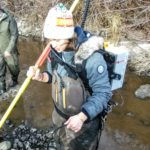Event PowerPoint Presentation
Speaker Resources
Union of Concerned Scientists Resources
Killer Heat Report and Killer Heat Interactive Map
Underwater Report and Underwater Report Interactive Map
Lowlander Center Resources
Coastal Louisiana tribes team up with biologist to protect sacred sites from rising seas _ Southerly How a coastal Louisiana tribe is using generations of resilience to handle the pandemic _ Southerly 2018 turner McClenachan backfilling plos one
CTUIR Resources
CTUIR CAP Ch One Excerpt for Aspen Institute ROAD 2021
First Foods Mission and Ecological Management
Event Description
Drought and wildfire in the West, rising seas and erosion in the Mississippi River Delta, and erratic weather patterns throughout the entire country are destabilizing rural and Tribal economies and quality of life. These climate impacts are worsening the already disproportionate burdens placed on rural people and Native nations because of a history of disinvestment and extractive natural-resource industry practices. In the face of these simultaneous global and hyper-local challenges, rural America and Native nations are essential partners in forging a different future.
July 16, 2021 speakers shared stories and practical tips from rural regions that are leading the way to this better future through climate-smart innovations. These pathfinders are also addressing key power-shifting challenges along the way: How can our transition to cleaner energy economies that reduce carbon emissions also strengthen community by engaging Native nations and rural communities of color? How can rural organizations build and retrofit more energy-efficient homes and offer new community energy options intentionally designed to build more financial stability for low-wealth people? How can rural climate-smart resilience efforts give those people with local and Indigenous knowledge who are most affected by planning decisions a voice in the planning process? Come explore how rural America is an essential partner in addressing climate change – and a source for innovative environmental justice initiatives that provide inspiration and useful ideas for the entire country.
Our Speakers
 Ajulo Othow, Founder and CEO of EnerWealth Solutions
Ajulo Othow, Founder and CEO of EnerWealth Solutions
Ajulo Othow founded EnerWealth Solutions, a solar and energy storage company that seeks to advance an ecologically sustainable world, where power is held locally and decisions are made democratically, where all electricity is generated by clean distributed renewables, and where economic prosperity is shared by all, especially those who have historically been left behind by America’s success. An attorney by training, her past experience includes work with Strata Solar, Oxfam America, and the Southern Rural Development Initiative. She lives on a small farm in Oxford, North Carolina.
 Curtis Wynn, CEO of Roanoke Electric Cooperative
Curtis Wynn, CEO of Roanoke Electric Cooperative
Roanoke Electric Cooperative distributes power to 14,500 member accounts in northeastern North Carolina. Under Curtis’s 22 years of leadership, the cooperative has advanced operationally and technologically to increase its system’s efficiency and resilience while improving service to its member-owners. Recently, Roanoke Electric began a number of projects including deploying new distributed energy resources. Curtis is also president of the National Rural Electric Cooperatives Association and serves on the boards of the National Rural Utilities Cooperative Finance Corporation, North Carolina Electric Membership Cooperative, and North Carolina Association of Electric Cooperatives.
 Shirell Parfait-Dardar, Traditional Tribal Chief of the Grand Caillou/Dulac Band of Biloxi-Chitimacha-Choctaw
Shirell Parfait-Dardar, Traditional Tribal Chief of the Grand Caillou/Dulac Band of Biloxi-Chitimacha-Choctaw
Shirell is one of the founding members of the First People’s Conservation Council of Louisiana. She advised the development of LA H.B.660 – Act #102, which established the Louisiana Governor’s Office of Indian Affairs’ Native American Commission in 2013, and was elected its first Native American Chairwoman in 2019. She is an active advocate for coastal restoration and preservation, development and utilization of alternative energy sources, community resiliency, education and human rights. Chief Shirell is also a traditional dressmaker/clothing designer, a songwriter, and a musician in her spare time, known for the films Into the Unknown (2020) and Facing the Rising Tide: Stories from Coastal Louisiana’s Tribes (2013).
 Kristina Peterson, Co-Founder of the Lowlander Center
Kristina Peterson, Co-Founder of the Lowlander Center
Kristina is an applied social scientist who studies scientist/community interaction, including how to support and prepare both scientists and community members for working together and how that work transforms both parties. Her work envisions a safe, healthy, just future by rejuvenating and restoring the human and non-human community through a rights-based approach and plenty of love. She has a passion for finding new and creative ways of problem solving by hearing stories of places and people, and she believes that understandings from our past and our ancestors (human and nonhuman) can help us live into the future with gentleness of spirit and the rejuvenation of our world.
 Wenix Red Elk, Public Outreach and Education Specialist for the CTUIR Department of Natural Resources
Wenix Red Elk, Public Outreach and Education Specialist for the CTUIR Department of Natural Resources
Wenix is the Public Outreach and Education Specialist for the Confederated Tribes of the Umatilla Indian Reservation’s Department of Natural Resources (DNR) where she educates the public on the First Foods management approach and coordinates and implements First Food related educational events, presentations, and cultural preservation excursions. Wenix has a AFA and BFA in Museum Studies from the Institute of American Indian Arts from Santa Fe, NM and a Masters in Organizational Management from the University of Phoenix. Wenix is an artist in many mediums and also instructs First Food and associated cultural classes such as food gathering, preparation mat making and other traditional art forms.
 Colleen Sanders, Climate Adaptation Planner for the CTUIR First Foods Policy Program
Colleen Sanders, Climate Adaptation Planner for the CTUIR First Foods Policy Program
Colleen has worked with the CTUIR First Foods Policy Program for over three years, and as a settler has been learning and unlearning many things about food systems and climate change for tribal people. Fascinated by the intersection between food production and wildlife conservation, her Bachelors of Science in Wildlife Ecology from the University of British Columbia, and Masters of Science in Community Food Systems has helped her approach climate change issues for the tribe by centering First Foods and its Indigenous food system in planning for adaptation. She spends her non-existent free time building a closer connection with her food, land, and her queer and autistic communities in Pendleton, Oregon.
Data and Context Presentation
 Jeremy Richardson, Senior Energy Analyst at the Union of Concerned Scientists
Jeremy Richardson, Senior Energy Analyst at the Union of Concerned Scientists
Jeremy hails from a third-generation coal mining family in West Virginia and holds more than ten years of experience in climate and energy issues. He focuses on federal climate and energy policy development, specializing in the economics of energy – particularly coal and nuclear power – and writes and speaks passionately about the need for a just transition for the coalfields. He has testified before the Senate Environment and Public Works Committee on the importance of economic diversification in coal country in the context of the EPA’s Clean Power Plan. From 2007-2008, he was the American Association for the Advancement of Science’s Roger Revelle Fellow in Global Stewardship.
Our Moderator
 Chitra Kumar, Acting Associate Director for Environmental Justice at US EPA
Chitra Kumar, Acting Associate Director for Environmental Justice at US EPA
Throughout her 17-year federal career, Chitra has helped create partnerships with federal, state and local organizations to develop more equitable strategies for environmental protection, land use and infrastructure, particularly in economically distressed small towns, rural areas, and urban neighborhoods. She serves as the Acting Associate Director of EPA’s Office of Environmental Justice. From March 2020-2021, Ms. Kumar was a Senior Fellow with the Aspen Institute’s Community Strategies Group, focused on bridging the fields of health, environment and economic development to improve rural well-being. From 2015-2019, she directed the Federal and State Division of EPA’s Office of Community Revitalization; in years prior, she served at the White House Council on Environmental Quality as the Deputy Associate Director for Water. A second-generation immigrant to the rural Midwest, Chitra is particularly interested in advancing equity, environmental sustainability, and economic resilience, while highlighting immigrants’ contributions to the American economy.
About the ROAD Sessions and Organizing Partners
The ROAD Sessions highlight and unpack rural development ideas and strategies that are critical in response to COVID-19 and to long-term rebuilding and recovery. ROAD Sessions feature stories of on-the-ground practitioners who have experience, wisdom and savvy to share. The series reflects and emphasizes the full diversity of rural America, spotlights rural America’s assets and challenges, and lifts voices and lived experience from a wide range of rural communities and economies. Each Session includes an added opportunity for peer exchange. Overall, the ROAD Sessions aim to infuse practitioner stories and lessons into rural narratives, policymaking and practice across the country, and to strengthen the network of organizations serving rural communities and regions.
The ROAD Sessions virtual exchanges are co-designed and hosted by Thrive Rural – an effort of the Aspen Institute Community Strategies Group in partnership with the University of Wisconsin Population Health Institute and with support from the Robert Wood Johnson Foundation – in collaboration with the Housing Assistance Council, the Rural Community Assistance Partnership, Rural LISC, and the Federal Reserve Board.

